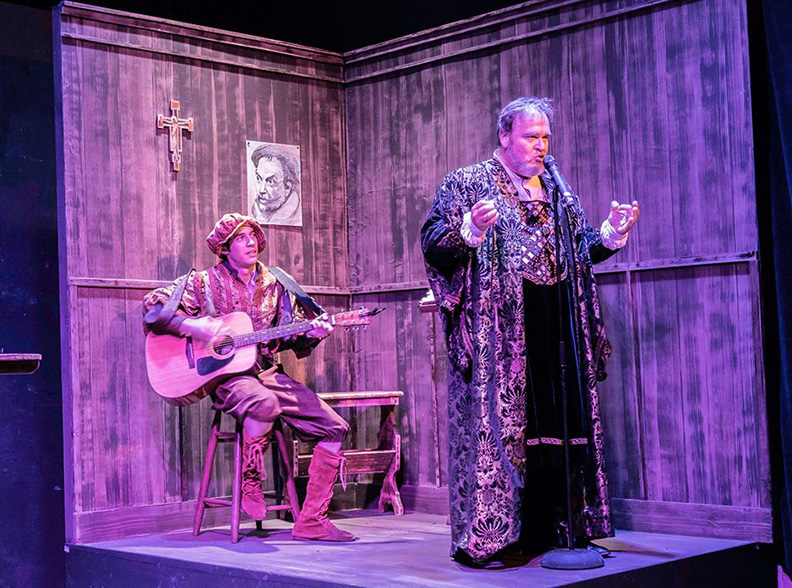Wittenberg
Oklahoma Shakespeare in the Park
8 p.m. July 30-Aug. 1
Oklahoma Shakespeare in the Park | Oklahoma City
Wittenberg is the smartest and wittiest comedy to play city stages since I don’t know when. It’s an intellectual comedy that’s actually funny, so it’s a pleasure to report that Oklahoma Shakespeare in the Park is giving this fine script an excellent production indoors at OSP’s Paseo location. OSP regularly produces non-Shakespearean plays, and they had to go all the way back to 2010 for this one by David Davalos, a playwright whose work I’d like to see more of.
Wittenberg has been described as a prequel to Shakespeare’s Hamlet. It’s set in late October 1517 in Wittenberg, Germany, both the town and university. The characters in this four-hander are Wittenberg University professors John Faustus, M.D., J.D. Ph.D., Th.D.; the Rev. Fr. Martin Luther, D.D.; their student Hamlet, prince of Denmark, a senior who’s on the university tennis team and has yet to declare a major; and four characters under the heading “The Eternal Feminine”: Gretchen, a working girl; Helen, a high-class prostitute; Mary, the mother of God (yes, that Mary); and a Danish ambassador who brings Hamlet some bad news. Davalos’ script drolly and effectively melds ancient and modern language. Faustus and Luther speak contemporary American English, while Hamlet speaks Shakespearean English.
OSP achieves with this play what theatergoers want to see all the time: a quality production of a worthy script. Richard Nelson directs the performance with a hand that’s both sure and light. You’ll not see one superfluous movement or wasted action. Plus, he has assembled an extraordinary cast and design team.
Any show with Mark Loftis and Doug Brown in lead roles will attract attention. Both actors display an admirable range of emotions here. We’re used to seeing Loftis dominate any stage he’s on, and his Faustus argues — or, rather, blusters — about thinking for oneself, as opposed to blindly accepting the Church’s unscientific doctrine. (Davalos has nothing new to say on this ancient subject. He just says what he has to say with an appealing style.) Loftis’ performance in Wittenberg makes his Big Daddy in last month’s Cat on a Hot Tin Roof look like a shrinking violet. But his Faustus is also devastated by disappointment.
Brown’s Martin Luther struggles to reconcile his true beliefs with the Church’s hypocrisy. He abhors the selling of indulgences. When Luther issues his 95 theses, Faustus is so impressed that he nails them to the church door himself. Brown and Loftis are two of our most experienced actors. To see them together in this play, playing these characters, is a joy to behold. Tommy Stuart plays Hamlet, matching the performances of Loftis and Brown. At one point, Faustus and Luther interpret one of Hamlet’s dreams and engage in a verbal tug-of-war that looks like something out of a Woody Allen movie. It’s no wonder Stuart’s Hamlet looks dazed and confused. Emily Brooks does a remarkable job as the four characters of the Eternal Feminine. You’d swear it’s four different actors playing the parts, and not just because of the wigs.
Overall, this is a complete production. Robert Pittenridge designed the period costumes with contemporary touches. Like college students today, Hamlet carries a backpack, and I envy him for his snazzy leather Converse tennis shoes. Ben Hall’s handsome scenic design features a gothic arch over the church door, and Scott Hynes’ lighting is spot on. OSP has upgraded its intimate Paseo performance space. The room still has sightline problems, but they’re making progress on it.
It’s hard to resist the temptation to quote Davalos’ sharp dialog. Faustus prescribes three cups of a special drink for Luther’s constipation as “two at Matins, one at Nones.” Similarly, Faustus has a part-time gig singing in a Wittenberg dive bar called The Bunghole (“Two stein minimum, all the tripe you can eat”).
Late in the play, Hamlet gets word that his father has died, and he must go home to Elsinore. Before they part company (neither knows it will be forever), Faustus and Hamlet make solemn promises to each other. Davalos then gives us a brief look into the future. No spoiler alert needed here: You know how the stories of Luther, Faustus, and Hamlet come to an end.





